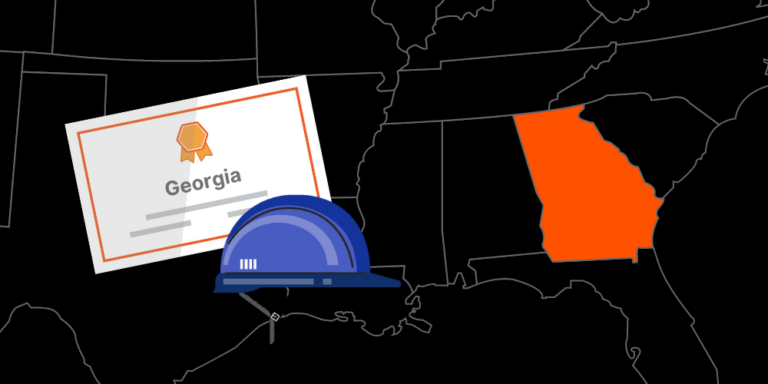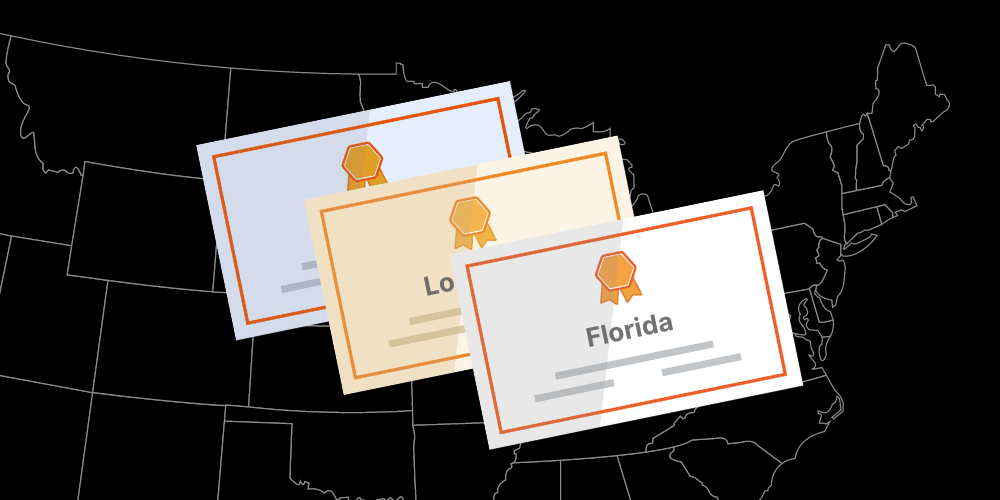— 5 min read
Georgia Contractor Licensing Rules & Requirements
Last Updated Dec 10, 2024
Last Updated Dec 10, 2024

In the State of Georgia, contractor licensing is governed by The Georgia State Construction Industry Licensing Board. Getting your Georgia contractor's license is an involved process, but it’s worth it. That's because a contractor license is necessary, and there can be serious consequences for contracting without a valid license.
Of course, certain specialty trades or work costing less than $2,500 might not require licensure. But that doesn’t mean you should just assume you don’t need one. It’s a good idea to play it on the safe side when it comes to licensing.
Let's take a closer look at contractor license requirements in the State of Georgia.
Table of contents
Georgia Contractor License: Basic Classifications
Residential & general contractors
Georgia has four levels of license classifications for contractor licenses that could apply based on the work performed. It shouldn’t be too hard to determine which one you fall under.
- Residential-Basic Contractor: These contractors work on one and two-family residences, plus single-family townhouses that are under three stories tall.
- Residential-Light Commercial Contractor: These contractors do all of the same work that's included in the Residential Basic license, plus they can perform work related to multifamily and multi-use light commercial buildings and structures.
- General Contractor: These services are pretty much unlimited regarding the type of work performed, bid, or agreed upon.
- General Contractor Limited Tier: These contractors can perform any type of work, but only on a contract worth under $1,000,000.
Specialty contractors
Not every type of specialty contractor work requires a special license to operate in Georgia, but the state does have licensing boards for electrical contractors, plumbers, and a few other trades.
- Electrical contractors are licensed by the Georgia State Board of Electrical Contractors.
- Plumbing contractors are licensed by the Georgia State Division of Master and Journeyman Plumbers
- Air conditioning contractors are licensed by the Georgia State Board of Conditioned Air Contractors.
- Low voltage contractors are licensed by the Georgia State Board of Low Voltage Contractors
- Utility contractors are licensed by the Georgia State Board of Utility Contractors
How to apply
Basic requirements
There are a few core requirements that you’ll need to apply for a Georgia contractor license, regardless of the category. The basic requirements to file for a Georgia contractor license are:
- Be 21 years old or older
- Be a US citizen or qualified alien
- Pass a criminal background check to show that you have "good moral character"
- Pay the (non-refundable) application fee
First-time applicants need to pass a license examination. Contractors seeking to reinstate their license or receive a license through reciprocity may be exempt from the exam.
Keep in mind that these are the basic requirements for contractor licensing in Georgia. Each category of license may carry additional requirements.
Veterans Preference Points
Under Georgia's Veterans Preference Points program, veterans applying for a contractor license may qualify for:
- Point credits on their exam
- Expedited application processes
Insurance requirements
Insurance is something a lot of contractors may not consider initially, but it’s very important. When applying for a contractor license in the state of Georgia, individuals must show proof of general liability insurance. The amount of insurance required varies based on the license classification. For example, contractors must show proof of general liability insurance with the following minimums (per occurrence):
- Residential-Basic Contractor: $300,000
- Residential Light Commercial Contractor: $500,000
- General Contractor: $500,000
- General Contractor Limited Tier: $500,000
Financial responsibility requirements
To qualify for a license, contractors must provide proof that they meet the minimum standards of financial responsibility.
- Residential-Basic Contractor: $25,000
- Residential Light Commercial Contractor: $25,000
- General Contractor Limited Tier: $25,000
- General Contractor: $150,000
Proof can generally be provided by one of the following:
- Net worth
- Letter of credit
- Line of credit letter
- Bank credit reference form
Applications
- Residential Contractors must apply through the State Licensing Board for Residential and General Contractors.
- General Contractors must apply through the State Licensing Board for Residential and General Contractors.
- Electrical contractors must apply through the Georgia State Board of Electrical Contractors.
- Plumbing contractors must apply through the Georgia State Division of Master and Journeyman Plumbers.
- Air conditioning contractors must apply through the Georgia State Board of Conditioned Air Contractors.
- Low voltage contractors must apply through the Georgia State Board of Low Voltage Contractors.
- Utility contractors must apply through the Georgia State Board of Utility Contractors.
Courses about construction.
For construction.
Unlock your career potential with our free educational courses on Health & Safety, Data in Construction, and more.
License reciprocity
If you’re based in a neighboring state such as Alabama, Florida, Louisiana, Mississippi, North Carolina, South Carolina, or Tennessee, you might be wondering if you can take advantage of reciprocity with your current license to work on a project in Georgia.
General contractors have reciprocity if licensed in Louisiana, Mississippi, North Carolina, and Tennessee. Residential Contractors are given reciprocity if they hold a license in Mississippi or South Carolina.
Out-of-state contractors will still need to pass the Georgia business and law exam before being issued a reciprocal license.
Air conditioning contractors have reciprocity from Louisiana, as long as they passed the exam. Georgia is currently reviewing reciprocity with South Carolina and Texas.
You can download an application for license reciprocity from the Georgia Secretary of State Forms page.
Learn more about licensing in nearby states:
Penalties for unlicensed contracting
While obtaining a license appears to be a bit of work, it’s worth it. Georgia prohibits anyone from performing residential or general contracting without a valid license. While penalties are not specifically laid out, consequences can be steep. Where licensing is required and an unlicensed contractor has agreed to provide work — the contract is unenforceable.
If you don't have the proper license for the work you're performing, you have no legal right to enforce the contract. If the owner decides not to pay you, you won't be able to file a lawsuit, a mechanics lien, or anything else to force payment under the contract. Further, you'll also be unable to obtain the necessary building permits without a valid license, which will cause even more issues down the road.
Bottom line: You can end up losing a lot more by contracting without a license than it likely would have cost you to obtain one.
Was this article helpful?
Thank you for your submission.
89%
11%
You voted that this article was . Was this a mistake? If so, change your vote here.
Scroll less, learn more about construction.
Subscribe to The Blueprint, Procore’s construction newsletter, to get content from industry experts delivered straight to your inbox.
By clicking this button, you agree to our Privacy Notice and Terms of Service.
Categories:
Tags:
Written by
Tom Scalisi
57 articles
Tom Scalisi is a writer with over 15 years of experience in the trades. He is passionate about educating contractors and specialty contractors about the best practices in the industry. He has seen first-hand how education, communication, and preparation help construction professionals overcome challenges to build a strong career and thriving business in the industry.
View profileExplore more helpful resources

Contractor License Bonds: Everything You Need to Know
In order to perform construction work, many states require contractors to be “licensed and bonded.” What does that mean? Well, every state sets its own rules for contractor licensing, and...

Contractor’s Guide to License Reciprocity: Working Across State Lines
For many contractors, growing a construction business means taking on jobs in different states. Whether it’s to take a one-off project or to establish a new business location, working in...

Vermont Contractor License: Guide to Rules & Requirements
If you’re starting a construction business in Vermont or looking to expand your business from another state, being properly licensed to work is one of the first key steps. There...

The Maine Contractor License: Guide to Rules & Requirements
If you’re considering starting a contracting business in Maine, it’s important to know the rules and requirements for proper licensing. Maine takes a different approach to contractor licensing than most...